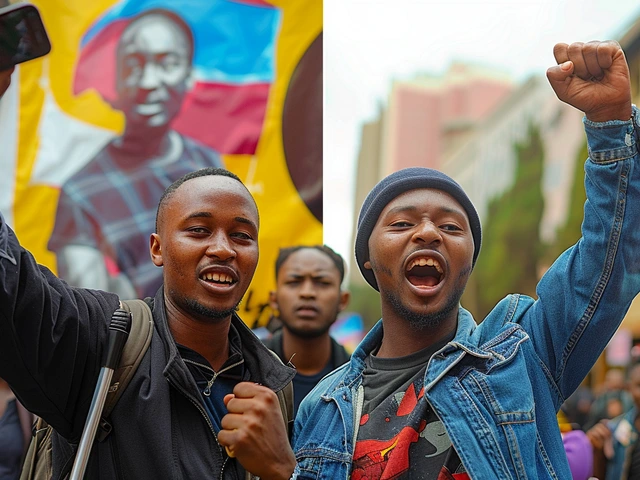When Sushant Kumar Nath, Chairman of the Odisha Police Recruitment Board and Director General of Prisons called an emergency meeting on Monday night, the state’s law‑enforcement hiring process was thrown into chaos. Within hours, Saravana Vivek M, Superintendent of Police, Berhampur led a joint raid that seized three sleeper buses near the Andhra Pradesh border, arresting a total of 122 people – 117 aspiring sub‑inspectors, two middlemen and three bus drivers.
Background of the CPSE 2024 Examination
The Combined Police Service Examination 2024 (CPSE 2024) for Sub‑Inspector posts was slated for 5‑6 October 2025, drawing over 30,000 candidates across Odisha. The exam, overseen by the Odisha Police Recruitment Board (OPRB), is the primary gateway for fresh talent into the state police force. Historically, the CPSE has been praised for its rigor, but a spate of leaked papers in neighboring states has made officials extra‑vigilant.
The Interception Operation
Intelligence arrived from an anonymous tip‑off on Monday, claiming that a group based in Vijayanagaram, Andhra Pradesh was ferrying the Si examination question paper to a hidden depot. Acting on the lead, a three‑member OPRB board – chaired by Sushant Kumar Nath – authorized a rapid response.
According to Saravana Vivek M, the operation unfolded as follows:
"We intercepted three AC sleeper buses just before they crossed the border near Baramunda in Bhubaneswar. The suspects were headed to a remote location in Vijayanagaram, allegedly to collect pre‑printed question papers. We moved quickly, detained everyone, and secured the buses before any papers could be handed over," he said.
The buses, each carrying around 40 passengers, were stopped near Golanthara police station in Ganjam district. Officers conducted a thorough sweep, but the alleged papers were not found – suggesting the conspirators might have used a double‑blind hand‑off system.
Details of the Alleged Scam
Investigators allege a sophisticated money‑lending racket. Each aspirant allegedly paid an initial ₹10 lakh, with a promise to cough up another ₹15 lakh after securing the job – a total of ₹25 lakh per candidate. The funds were funneled through three middlemen who coordinated transport, payment collection and alleged paper delivery.
Key points uncovered so far:
- 117 of the arrested were genuine exam candidates; eight were women.
- Three individuals identified as "agents" were believed to be the top‑level coordinators.
- The Crime Branch has lodged charges under multiple sections of the Bharatiya Nyaya Sanhita, including Sections 319(2) and 338, as well as the Odisha Public Examination (Prevention of Unfair Means) Act 2024.
- Interrogations ran late into the night, with some candidates held until 3 AM to map the full network.
One aspirant, who asked to remain anonymous, confessed: "We thought it was a shortcut, a guaranteed job. Nobody told us it would end up like this. The money was gone, and now we’re facing jail."
Reactions from Officials and Candidates
The OPRB issued a statement emphasizing zero tolerance for malpractice. "The integrity of our recruitment process is non‑negotiable," said Sushant Kumar Nath. "Anyone caught attempting to undermine it will face the full force of the law."
Candidate groups expressed a mixture of shock and relief. The Odisha Young Aspirants Forum (OYAF) posted on social media: "We’re grateful for swift action. Thousands who prepared honestly deserve a fair chance."
Legal experts warn of a ripple effect. Former Supreme Court advocate Anita Rao noted, "This case could set a precedent for how state‑run examinations are protected against organised fraud. The courts will likely scrutinise the evidence on the money‑laundering side as much as the alleged paper leak."
Legal Proceedings and Future Steps
The case has been registered at Golanthara police station. The Crime Branch, now led by its Director General, is preparing to seek judicial remand for deeper probing of the network. According to the branch, "We suspect more agents are operating across state lines, possibly using digital channels to coordinate."
The board has postponed the CPSE 2024 written exam, rescheduling it to a later date pending a thorough security audit. In a meeting with the state’s Home Department, officials pledged tighter surveillance, random paper swaps and biometric verification of candidates.
Broader Implications for Public Examinations
While Odisha’s crackdown is a local story, it highlights a national concern. Recent leaks in Karnataka, Tamil Nadu and West Bengal have prompted central authorities to consider a unified anti‑cheating framework.
Experts suggest the following measures could fortify future exams:
- Encrypted digital distribution of question papers with time‑locked decryption.
- Real‑time CCTV monitoring in transit routes used for paper movement.
- Mandatory financial background checks for agents handling exam logistics.
If implemented, these steps could curb the kind of multi‑layered racket that tried to unfold in Odisha. For now, the state’s decisive action serves as a warning: the recruitment ladder is being guarded more tightly than ever.
Frequently Asked Questions
How does the scandal affect legitimate CPSE candidates?
The written exam has been postponed, giving honest aspirants extra preparation time. The OPRB promises a cleaner, more secure exam environment, but the delay may also affect job‑placement timelines for thousands of candidates.
What legal charges are the arrested individuals facing?
They have been booked under sections of the Bharatiya Nyaya Sanhita (including 319(2) for cheating and 338 for causing grievous hurt) and the Odisha Public Examination (Prevention of Unfair Means) Act 2024, covering cheating, forgery, fraud and illegal financial transactions.
Who coordinated the interception operation?
The operation was directed by Sushant Kumar Nath as OPRB Chairman, with execution led by Saravana Vivek M, SP of Berhampur, supported by a 14‑member Crime Branch team.
What steps are being taken to prevent future exam scams?
The state government is reviewing its paper‑distribution protocol, considering encrypted digital delivery, biometric candidate verification, and tighter monitoring of transport routes. A special task force will continue to audit recruitment processes.
Are there indications of a larger, interstate network?
Investigators believe higher‑level agents operating from Andhra Pradesh coordinated the scheme. Ongoing digital forensics aim to trace financial flows and communication links that could reveal a broader criminal ring across multiple states.



This whole rigged bus fiasco is a direct attack on our nation’s integrity 🙅♂️. If criminals think they can buy police jobs, they’re gravely mistaken. The state must clamp down harder; no one is above the law.
Oh great, another ‘quick shortcut’ to a sub‑inspector badge. Because nothing says ‘public service’ like paying lakhs for a paper you’ll never even see. Guess honesty really is optional these days.
Look the scam shows how deep the money‑lending racket went it wasn’t just a few bad actors it was an organized network exploiting desperate youths the system must get smarter and transparent
For anyone worried about the exam timeline, the postponement gives candidates extra preparation time. The board has also announced tighter security measures, including biometric verification and encrypted paper distribution. These steps should restore confidence.
When a state’s recruitment is corrupted, it tarnishes the very soul of the nation. One must ask: does a society that sells its guardians still claim to uphold justice? The answer, of course, lies in collective vigilance and unwavering resolve.
I can’t even begin to imagine the panic those 117 hopefuls felt when the buses were rolled up 🚍💔. Their dreams crushed, wallets emptied, futures on hold – it’s a heartbreaking saga that haunts the corridors of every exam hall.
Nice job by the OPRB, they really moved fast on this 🚓. Hopefully the crackdown will deter future scams and give honest aspirants a fair shot. Keep the updates coming!
I feel for the candidates who got caught up in this mess, especially the eight women. It’s tough, but the right thing is being done now, and they’ll have a chance to rebuild. Stay strong, everyone!
The operation intercepted three buses near the border and arrested 122 individuals. No exam papers were recovered, which suggests a possible double‑blind hand‑off. Further digital forensics may reveal the broader network.
Interesting how the middlemen demanded ₹25 lakh per candidate. That’s a hefty price for a job that’s supposed to be merit‑based. I wonder if similar schemes have been uncovered elsewhere in India.
From a societal perspective, such scams erode public trust in institutions that safeguard law and order. The moral compromise affects not just the aspirants but the community that looks up to the police. Addressing the root causes-economic disparity and lack of transparent processes-will be essential for lasting reform.
The financial architecture of this racket reads like a textbook case of money‑laundering intertwined with exam fraud.
First, aspirants inject an upfront capital of ten lakhs, which serves as a seed fund for the operation.
Second, the intermediary tier aggregates these funds and channels them through shell corporations registered in neighboring states.
Third, a logistical overlay involving sleeper buses ensures the physical movement of both cash and alleged question papers.
Fourth, the encrypted communication channels between the Andhra‑based hub and local handlers mitigate interception risks.
Fifth, the payoff model promises a post‑exam disbursement of fifteen lakhs, effectively creating a profit margin of fifty percent.
These layers constitute a multi‑vector risk matrix that overwhelms conventional detection mechanisms.
Moreover, the use of biometric spoofing tools could further obfuscate participant identities.
The legal implications span sections of the Bharatiya Nyaya Sanhita, the State Examination Act, and anti‑money‑laundering statutes.
From a governance standpoint, the OPRB’s rapid response showcases a commendable inter‑agency coordination protocol.
However, the absence of the actual question papers suggests a potential fallback plan or a double‑blind exchange.
Future preventive strategies must incorporate blockchain‑based paper authentication to nullify paper‑leak vectors.
Additionally, predictive analytics can flag abnormal payment patterns among exam candidates.
Stakeholder engagement, especially with candidate communities, will be vital to dismantle the demand side of the scam.
In sum, a holistic approach integrating technology, policy, and community awareness is the only viable pathway to safeguarding the integrity of public examinations.
The curtains have fallen on a grim tableau of corruption that threatened to stain the very badge of our police force. In this act, the state has played the protagonist, confronting the villains with unwavering resolve. Let this be a lesson etched in the annals of our justice system.
Ah, the melodrama continues, yet the script seems written by bureaucrats wielding ink‑filled pens instead of swords. One might jest that the real battle lies not in buses but in the labyrinth of paperwork that fuels such conspiracies. Nonetheless, the drama serves as a stark reminder that vigilance must never be theatrical, but perpetual.
The cross‑state dimension of this scheme underscores the need for coordinated policing across borders. By sharing intelligence and standardising protocols, states can preempt similar attempts in the future. Collaborative frameworks will be the cornerstone of national security in exam administration.
While cooperation sounds ideal, one could argue that centralised oversight often breeds complacency. The real issue may be the unchecked ambition of middlemen who view exams as commodities. Perhaps the system itself is ripe for exploitation, regardless of inter‑state ties.
Wow!!! This whole incident really highlights how deeply money can infiltrate even the most sacred institutions!!! It’s shocking!!! But also a wake‑up call for all of us!!! We must stay alert!!!
The scam shows we need better checks. Simple steps like random paper swaps can help.
Honestly, these half‑baked suggestions are laughable. If you think swapping papers will stop a multi‑crore racket, you’re naive. The problem runs deeper than superficial tweaks, and anyone ignoring that is complicit.
Hope the honest candidates finally get the chance they deserve.